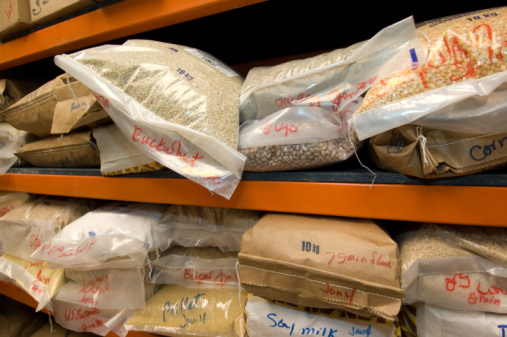originally posted by: Thomas Miller, personalliberty.com

There are many things that are nice to have. My car is nice to have. Would life be difficult without it? Yes. Would the lack of having a car keep me from ever going anywhere? No. If I didn’t have a car, I would still get places via bus, covered wagon, walking or however I needed to in order to get where I needed to go. It’s also nice to have a big TV. But if I didn’t have one, I would have to learn to have a conversation again.
With all that said, there are those things that are not optional. Among other things, we need to have oxygen to breathe, water to drink and food to eat. If my ability to get food were suddenly taken away, I would be in a tough spot. I guess I would not have to worry about being alone in my tough times, though. My wife and kids would be right there with me, which would make things even worse than being alone in my difficulty.
I recently ran across the following account on an online forum:
My girlfriend asked me something last night…what if the grid did go down and we were unable to fix it for a long time (couple years)? Or what if SHTF and we were forced to bug out.
- Where would we go?
- What about the rest of society?
The main question she asked; say SHTF or the grid goes down… How long would the food in this country last? Yes we are stocked up for a while, but what about when the other millions of people run out? Where will they turn to when food can’t be found?
I honestly told her that they would become extremely irritable and hostile. People will do whatever it takes to get food for family.
Obviously we wouldn’t be safe in our own home for long since we’re basically right on the outskirts of town. Then she asked what if we had to bug out? It would be extremely hard with three kids. Especially since one has autism. What happens when you’re at your bug out location and someone is nearby and will kill for food? How do you get the kids to stay quiet when life depends on it?
These are some legitimate concerns, and the questions really got me thinking. My initial thought is that I would not want to go anywhere unless I had to. If a catastrophic event were to happen and I was not already at a bug-out location, my guess is that trying to get there would be extremely dangerous and maybe not even possible. Even if people still had food, there would be bands of those who would look to take advantage of others and capitalize on their weaknesses.
I think that the rest of society would quickly see that things were not going well and either hunker down alongside me or make a run for it. Where are they all going to go? I couldn’t tell you. There are many theories floating around that revolve around the idea of fleeing to the state and national forests to take advantage of water supplies and the amount of readily available food. Is this going to be a great idea if everyone else is thinking the same thing? Probably not. I’ll be staying put unless I absolutely can’t for some reason.
There is probably not a single person who knows how long the food supply would actually last following a complete collapse. I know one thing for sure; it will not be long enough. I think the gentleman who posted the account above was right. People without food will turn toward others, hoping for some sort of help. And if that doesn’t happen, the animal nature that we have inside of us will rapidly appear.
To me, this highlights the importance of working hard now to set aside food. In the case of food for survival, it should probably be as much food as possible because food is a finite resource. When it is gone, it is gone. I know that we all have limitations, so it is important to try to achieve a balance in your food stores. You should also have a strategic plan that not only provides a way to eat now and eat over the course of the next few months but a way to produce food down the road as well. A balanced, strategic plan might look something like the following plan:
Present: Food supply to last at least three to six months
- Meats: A combination of frozen and canned meats to include a variety of beef, pork, poultry and fish.
- Fruits: A mix of rotated fresh and canned fruit varieties.
- Vegetables: A mix of rotated fresh and canned fruit varieties.
- Starches, grains and nuts: These could be instant potatoes, pastas, rice, steel cut oats, almonds, peanuts, etc.
- Proteins: In addition to meat, have some protein sources on hand like nut butters, beans, peas and eggs.
- Baking and cooking: This will be all of the basics like flour, sugar, spices and seasonings, and oils.
- Dairy: It can be a challenge to keep fresh dairy for long periods of time; so look to things like powdered milk, eggs and cheese for long-term solutions (these will also fit into the future category).
Future: Food supply to extend past six months and, if properly managed, could last for as long as the food source continues to produce
- Dehydrated and freeze-dried foods: Long-term varieties last for up to 25 years when stored properly. It is hard to have too much on hand.
- Fruit and vegetable seeds: Gardening will be vital for long-term production of fruits and vegetables. One of my favorite sources of seeds for storage is the Survival Seed Vault, which has more than 5,000 heirloom variety seeds that will last for at least five years, all in a compact storage container.
- Animals for meat and dairy: To provide a complete diet, protein and dairy will be needed. Cows, pigs, chickens, fish, etc. can all be raised on a farm. But even in confined urban areas, birds like pigeons, rabbits and fish in an aquaculture setup can be raised as meat sources. Dairy can be tricky in smaller areas, but one practical solution may be goats.
- Tools: While not a food, all of the sources of renewable long-term foods require tools to ensure to ensure proper cultivation, maintenance and harvesting.
There is more to ensuring your future food supply than what I mentioned already. When looking to the future and the possibility of having to supply and secure your own food, community will be vital. You will have to work with others to maintain and guard your food supply. This makes it important to build relationships with those around the area where you most likely will have to ride out a catastrophe. If you can find others in your community that you can trust to assist in food production and security, you are better off than most.
You must also consider the amount of water that will also be needed to accompany the efforts you will have to endure to prepare and raise the food required to survive long term. Water will be needed to prepare food, wash dishes and utensils, water a garden, water animals, and clean butchered meat animals. This makes food a greater challenge because in addition to needing everything above, you need water to go with it on top of water for drinking and hygiene.
In the end, a little planning now on not only how to secure your food supply over the first few months of a disaster but also during the years to follow will go a long, long way. Ultimately, making a plan now can greatly secure your future. A little bit of planning and networking is all that it takes. Although, having the financial resources to buy food and having a place to put it are helpful as well. If you have any questions or recommendations, shoot me an email at tom@thepreparedninja.com. Good luck!



